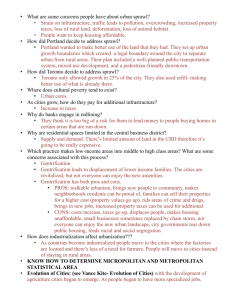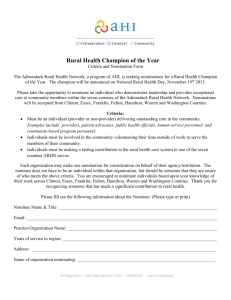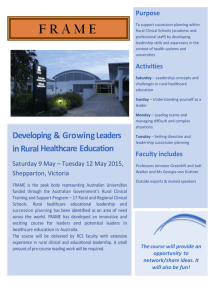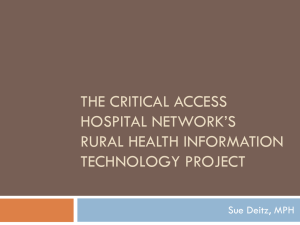Session 1 Worksheet
advertisement
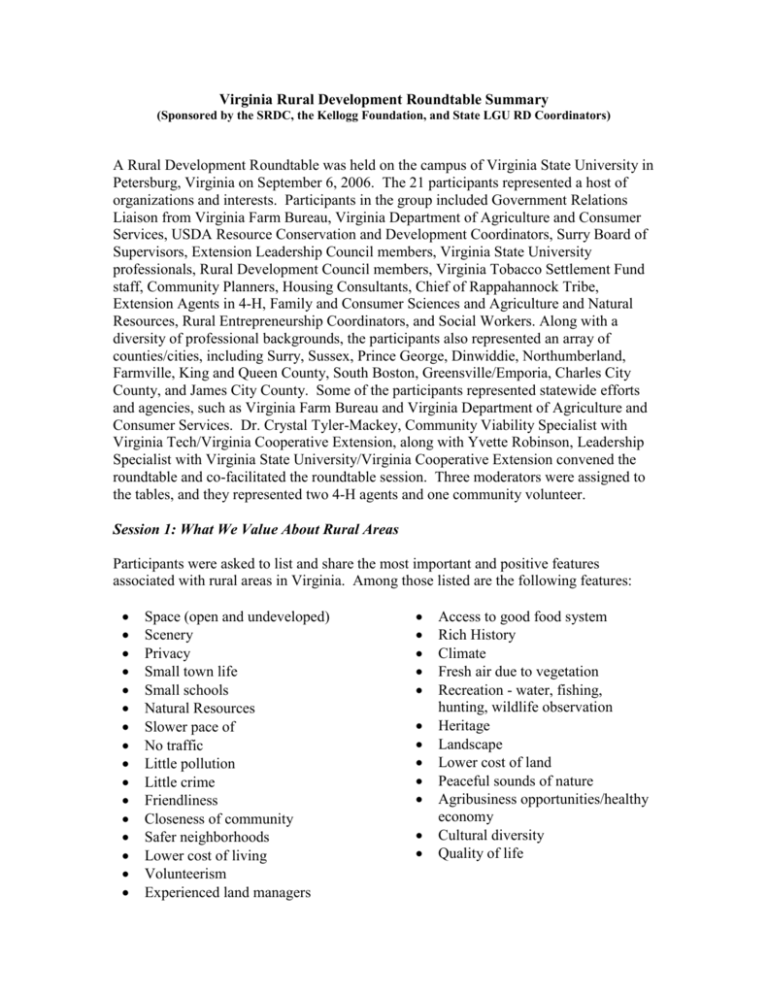
Virginia Rural Development Roundtable Summary (Sponsored by the SRDC, the Kellogg Foundation, and State LGU RD Coordinators) A Rural Development Roundtable was held on the campus of Virginia State University in Petersburg, Virginia on September 6, 2006. The 21 participants represented a host of organizations and interests. Participants in the group included Government Relations Liaison from Virginia Farm Bureau, Virginia Department of Agriculture and Consumer Services, USDA Resource Conservation and Development Coordinators, Surry Board of Supervisors, Extension Leadership Council members, Virginia State University professionals, Rural Development Council members, Virginia Tobacco Settlement Fund staff, Community Planners, Housing Consultants, Chief of Rappahannock Tribe, Extension Agents in 4-H, Family and Consumer Sciences and Agriculture and Natural Resources, Rural Entrepreneurship Coordinators, and Social Workers. Along with a diversity of professional backgrounds, the participants also represented an array of counties/cities, including Surry, Sussex, Prince George, Dinwiddie, Northumberland, Farmville, King and Queen County, South Boston, Greensville/Emporia, Charles City County, and James City County. Some of the participants represented statewide efforts and agencies, such as Virginia Farm Bureau and Virginia Department of Agriculture and Consumer Services. Dr. Crystal Tyler-Mackey, Community Viability Specialist with Virginia Tech/Virginia Cooperative Extension, along with Yvette Robinson, Leadership Specialist with Virginia State University/Virginia Cooperative Extension convened the roundtable and co-facilitated the roundtable session. Three moderators were assigned to the tables, and they represented two 4-H agents and one community volunteer. Session 1: What We Value About Rural Areas Participants were asked to list and share the most important and positive features associated with rural areas in Virginia. Among those listed are the following features: Space (open and undeveloped) Scenery Privacy Small town life Small schools Natural Resources Slower pace of No traffic Little pollution Little crime Friendliness Closeness of community Safer neighborhoods Lower cost of living Volunteerism Experienced land managers Access to good food system Rich History Climate Fresh air due to vegetation Recreation - water, fishing, hunting, wildlife observation Heritage Landscape Lower cost of land Peaceful sounds of nature Agribusiness opportunities/healthy economy Cultural diversity Quality of life The top 5 most positive features about rural areas in Virginia as agreed upon by the roundtable were: 1. 2. 3. 4. 5. Open space, undeveloped land Quality of life Quality of people Economic development opportunities Heritage, history Session 2: Priorities for Strengthening the Future of Rural Areas: In Session 2, participants were then asked to identify the topics that were of the highest priority to promoting the long-term survival and strength of rural areas in Virginia. The following topics were identified individually by participants: Health Economic Development Leadership/Governance Education and Workforce Development Leadership, citizen participation, governance Economic, social, poverty Citizen participation Health and Nutrition Natural and environmental resource management Public service, public infrastructure Economic and social inequality Public services The group then narrowed the individual responses to the following top 3 priority areas, with reasons for why these topics are of highest priority: 1. Economic Development: Economic development should be looked at and planned with local leadership. Issues to attract businesses to the area that were also noted as priorities include leadership, a sufficient workforce, and housing. 2. Education/Workforce Development: There is an insufficient amount of jobs in rural areas particularly high-wage jobs, as well as a need to maintain/attain agricultural profitability. 3. Leadership/Citizen Participation: Rural areas need strong local leadership to provide for economic development opportunities, as well as to effect change in education/workforce development programs, as well as the housing issues that many rural areas are facing. Session 3: Digging Deeper into the 3 Priority Areas: The goal of Session 3 was to delve more deeply into each of the 3 rural development priority areas identified by the roundtable above. To this end, the roundtable was asked the following two questions for each priority area: (1) What specific challenges are rural areas in your state facing right now with regard to the topic? (2) What strategies or initiatives should be launched to help rural communities/counties in your state as it relates to this priority area? 1. Economic Development Challenges: Unidentified strengths and weaknesses Finance – lack of capital for start-up or improvement Partnerships among public and private funding sources Quality workforce – lack of customer service skills; positive drug testing) Available jobs – replace lost jobs Maintaining industry Transportation –infrastructure Housing – infrastructure Leadership barriers Location needs to provide education, recreation, and healthcare Traditional agriculture fading away Average age of Virginia farmers Youth moving out of area Need organized, comprehensive plans High cost of land Strategies/Initiatives: Regional cooperation Update state incentive programs Agricultural marketing education Develop specialty crops/value-added opportunities Business plan workshops Farm transition workshops Provide programs to aid farmers in selling land to preserve open space Improve images of rural communities Planning sessions for elected leaders Attract learning institutions 2. Education/Workforce Development Challenges: Teacher recruitment/retention Lack of vocational education/not valued Youth lack life skills Lack of school-family partnerships Lack of information regarding jobs available to youth Distance learning needed Lack of access to educational opportunities – transportation Cost of higher education increasing rapidly Rural/urban funding disparities Cooperative leadership between school board and supervisors Students uninterested in school Connect current education trends with community needs Adults face must choose work or training Strategies/Initiatives: Distance learning and regional education opportunities Strengthen vocational education Initiate workforce development training, incl. internships/apprenticeships and job shadowing Provide field trips to local employers for youth and adults Market post-secondary opportunities Enhance existing educational programs Enhance computer accessibility/new technology Gain visible commitment to education from leaders – incl. funding Increase funding for K-12 Redistribute lottery funds used for education Reinstitute state teacher scholarships 3. Leadership/Citizen Participation/Governance Challenges: Lack of vision Lack of money to attract quality administrators Community participation Resistance to change Key persons lack leadership skills Lack of regional collaboration Good old boy/girl syndrome Bias Privacy issues/personal sovereignty issues Lack of community involvement by citizens Lack of required leadership training necessary Lack of interest in serving in elected/leadership positions Low/no turnover Poor compensation for leaders Strategies/Initiatives: Educate local leaders in mandatory program Marketing of leadership opportunities and need for citizen participation Voter registration promoted Develop neighborhood networks for voicing concerns Develop ad-hoc advisory group in each voting district Hold council/board of supervisors meetings at schools Provide youth leadership training Hold regional resource leveraging strategic sessions Educate community members on leadership Session 4: What your State’s Land-Grant Universities Should Do in the Rural Development Arena Finally, roundtable participants were asked to identify what they feel are the most critical roles the state land-grant universities should be playing in addressing the challenges and working on the strategies/initiatives identified in Session 3. The following summarizes responses to key areas in how land-grant universities can assist in state rural development efforts: Rural Development Research Needed: Economic Development Analyze telecommunications “e” commerce and distance learning capabilities in rural areas Technological information needed to compete globally Economic development activities in rural VA Feasibility studies for alternate businesses Determining appropriate businesses for community Profitability of potential non-traditional enterprises Niche marketing/specialty/value-added agriculture opportunities Alternate crops/livestock suitable to region How to make idle land profitable How much capital invested in each region Business start-up and failure rate by county, incl. capital invested Do a community survey to identify what is important economically Rural Development Extension/Outreach Programs Needed: Economic Development Educate land owners on opportunities for changing agriculture On-farm research plots, trials, or demos Work with counties with highest rates of unemployment Classes on business creation and continuation Marketing education for businesses Website development training Farmland transition assistance Teach goal-setting and business management Grants workshops Aid communities to assess strengths and weaknesses and how to apply info to economic development opportunities Rural Development Research Needed: Education/Workforce Development Analyze educational funding levels per Standards of Learning category rank Do a community survey to identify what is important educationally Efficacy of lottery and tobacco funds on workforce development and education Assess high schoolers’ knowledge of financial management and tools Research funding sources to enhance educational system, vocational education and workforce development programs Research college scholarships and internship opportunities for use by local schools Impact of vocational education programs in communities and if they can be sustained Rural Development Extension/Outreach Programs Needed: Education/Workforce Development Life skills training for youth Job skills training Work with counties with highest rates of unemployment Rural Development Research Needed: Leadership/Citizen Participation Training that current elected officials had prior to taking office and what they feel would have been helpful Leadership training needs for elected and appointed leaders in local government Leadership and decision making dynamics and process by city Regional cooperation models and Best Management Practices Assess reasons for lack of citizen participation in local leadership Rural Development Extension/Outreach Programs Needed: Leadership/Citizen Participation Leadership training for elected and appointed local leaders Create rural leadership program for potential and current locally elected officials Distance learning tools for training, resource leveraging, and interactive sessions for government leadership Teach local governments about regional cooperation Aids groups in working together for better outcomes Leadership development education for youth and adult citizens Teach citizenship and local government to youth Conflict resolution Partners With Whom the LGUs Should Partner: Local economic development offices Industrial development authorities Community development loan fund institutions Non-profit housing groups for home ownership training Local community colleges Virginia Department of Agriculture and Consumer Services Local community leaders Regional partnerships – Planning district communities Community action agencies Departments of Tourism Resource Conservation and Development Chambers of Commerce/Better Business Bureau Micro-enterprise agencies Local governments School systems Libraries Virginia Department of Business Assistance Resource leveraging partners Private entities – citizens, corporations, non-profits, etc. Grant sources All local agencies Virginia Department of Education Financial institutions – banks, credit unions, etc. Virginia Association of County Officials Virginia Department of Economic Development



